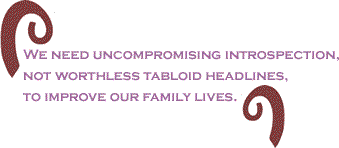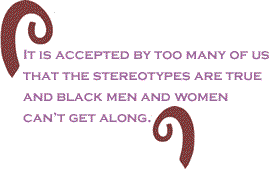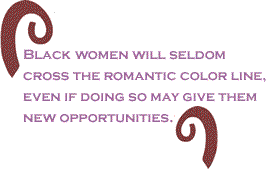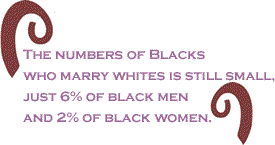
|
|||||||||||||||||||||
|
The quickest way to bring anger, tears, and vitriol to any conversation among Black people is to discuss the state of Black male and female relationships. If it is true that men are from Mars and women are from Venus it must follow that healthy relationships are difficult to maintain. Add racism, the economic marginalization of black people, high rates of black male incarceration, and early death, and we have the perfect storm for relationship and marital instability. It is accepted by too many of us that the stereotypes are true and black men and women can’t get along. But in spite of lower marriage rates and higher divorce rates we remain fiercely loyal to the idea of intact black families. Unfortunately the desire for strong family life may cause us to waste precious time supporting ideas that have no basis in reality and distract us from the crucial issues that are relevant to developing strong family life. If enough people cry that the sky is falling then interesting if amusing ideas like “man sharing” may be taken seriously. The argument was made that the imbalance in numbers of available men already results in unofficial man sharing. A recent Chicago based study, The Sexual Orientation of the City, concluded that 21% of Black male residents were involved with more than one woman, as opposed to 6% of men overall in Cook County. The statistics are not an indication of greater immorality on the part of black men, but instead reflect the temptation created by numbers that work in men’s favor. As Chris Rock pointed out, most men are “as faithful as their options.” It has been suggested that man sharing, de facto polygamy, should be encouraged. However, the idea fell flat because neither women nor men are interested in participating. Women don’t want to share men, and most men don’t want the complications in their lives. Those women who are involved in these relationships do so unknowingly or unwillingly. Some do not want to be alone, or believe that a shared man is better than none. Man sharing is an idea whose time has not yet come and is an example of what happens when hysteria and incorrect assumptions are allowed to rule the day.
The problems of black marriage and relationships are exacerbated by statistics that never bring good news. There is no escaping the fact that the gender ratio works against black women. If it is seriously suggested that women accept polygamy, a system which goes against American cultural and religious norms, interracial dating might be seen as an option. But black women will seldom cross the romantic color line, even if doing so may give them new opportunities in their social lives. The only subject more painful than the state of black male and female relationships is the issue of relationships outside of our race. The belated acknowledgement that segregationist Strom Thurmond fathered a half-black child is a reminder of the awful sexual subjugation endured by black women throughout American history. Thousands of black men lost their lives when accused of merely “reckless eyeballing” in proximity to white women. In addition to the historical legacies of racism, most black people simply want to be with their own, so much so that we risk not forming families at all in our hopes of beating the odds. The sight of celebrities like Quincy Jones, with a long list of blonde ex-wives, may be the subject of gossip and condemnation, but the behavior is atypical. The numbers of Blacks who marry whites is still small, just 6% of black men and 2% of black women. Those figures are not an indication of people who don’t want to be together. But is it enough to say that everything is fine because we still marry each other more than we marry others? It is true that Black men and women are less likely to be married and are more likely to divorce even when we do marry. The consequences are acute for men as well as women. Divorced men experience more illness, substance abuse, and even suicide attempts. Children in single parent, usually female headed households, are more likely to live in poverty.
Attributing family problems to economic issues provides an easy out in explaining away disproportionate instability in the family structure. Issues such as the high rate of births outside of marriage have been the third rail of black political and social discourse. We don’t want to discuss anything that gives credence to negative stereotypes perpetuated about us. The impulse is understandable, but not particularly helpful when confronting difficult issues. Why are so many black children born not only to unmarried parents, but to parents who have not even formed committed relationships? Because of DNA testing there are men paying child support to women whose middle names they don’t even know. That behavior doesn’t speak well for men or women and renders moot the old, tired arguments seen in the headlines of black publications and heard in conversation. “Whose at fault, men or women?” “Do black men treat women right?” “Do black women support their men?” We need uncompromising introspection, not worthless tabloid headlines, to improve our family lives.
It is important to remember our loyalty to one another despite the many problems that black people face in dating and maintaining marriages. Point out that the glass is full the next time someone says that black men and women can’t get along. But it is equally important to speak up when the more complicated and sensitive issues are also raised. The time for platitudes has passed as well. Margaret
Kimberley’s Freedom Rider column appears weekly in |
January
29,
2004 |
|||||||||
|
|||||||||
|
|
|||||||||
| Printer Friendly Version | |||||||||
 |
|||||||||
| |
|||||||||
| |
|||||||||




























